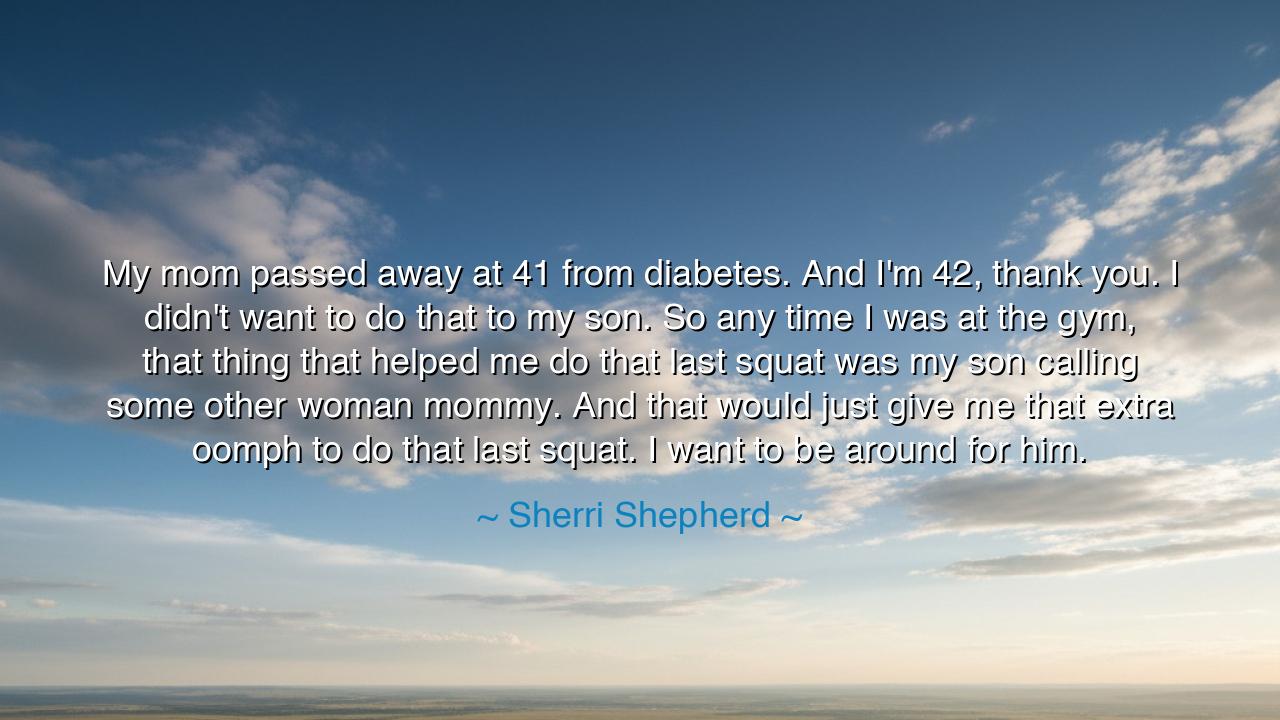
My mom passed away at 41 from diabetes. And I'm 42, thank you. I
My mom passed away at 41 from diabetes. And I'm 42, thank you. I didn't want to do that to my son. So any time I was at the gym, that thing that helped me do that last squat was my son calling some other woman mommy. And that would just give me that extra oomph to do that last squat. I want to be around for him.






The words of Sherri Shepherd — “My mom passed away at 41 from diabetes. And I’m 42, thank you. I didn’t want to do that to my son. So any time I was at the gym, that thing that helped me do that last squat was my son calling some other woman mommy. And that would just give me that extra oomph to do that last squat. I want to be around for him.” — are not only a confession of grief and determination, but a testament to the sacred bond between a mother and her child, and to the power of love as motivation for survival. Beneath these words lies the rhythm of the eternal struggle — the desire to rise above fate, to break the chains of inherited pain, and to live fully for the sake of those who depend on our strength.
To lose a mother so young is to feel mortality as a shadow that lingers near. When Sherri speaks of her mother dying at forty-one, and herself living beyond that age, there is both triumph and trembling in her voice. For in her survival, she carries not only her own life but the memory of the one who came before. The disease that took her mother becomes not just a medical condition, but a symbol of destiny defied. Through exercise, through sweat, through discipline, she is not merely training her body — she is fighting history itself.
Her words also reveal the transformative power of love. It is her son, not vanity, not ambition, who gives her the strength to push through exhaustion. She imagines a future without her presence — the unbearable image of her son calling another woman “mommy” — and that vision, painful as it is, becomes her greatest source of energy. This is love in its most ancient form: protective, fierce, and self-sacrificing. It mirrors the mothers of legend who endured hardship for the sake of their children — like Spartan mothers who told their sons to return with their shields or upon them, or Mary of Nazareth, who bore sorrow so her child could fulfill destiny. Love, in its truest form, does not only comfort; it commands action.
What makes her confession powerful is its raw honesty. She does not pretend that willpower alone sustains her. Instead, she reveals that endurance is born of emotion — that the most profound motivation often comes not from self-discipline, but from fear and devotion intertwined. The ancients called this eros — not the romantic kind, but the life-force that binds one soul to another. Her son is her lifeline, her sacred purpose. In his existence, she finds redemption for her mother’s early death and transformation for her own destiny.
Her story recalls that of Florence Nightingale, who, though born into comfort, felt called to labor tirelessly for the sick and the dying. Nightingale too was driven not by personal gain, but by a love that transcended the self — a determination to preserve life where death seemed inevitable. In both women, we see that same divine rebellion — the refusal to surrender to circumstance, the vow to protect life even when pain is inevitable.
But there is also something universal in Sherri’s message. It is not only about health or motherhood, but about choosing purpose over surrender. Every person faces something inherited — illness, poverty, trauma, fear — and each must decide whether to repeat the cycle or to break it. Her mother’s death was the darkness that could have consumed her; instead, it became the fire that forged her resolve. In her determination to “be around” for her son, she becomes a living embodiment of the ancient teaching: that the truest strength is born from love, and the truest love is proven in endurance.
From this, let every heart take its lesson: love is the greatest motivator for transformation. If you struggle to change, find someone or something you love enough to fight for. Let that vision guide you through the final repetition, the hardest day, the darkest hour. Sherri Shepherd’s story reminds us that legacy is not fate — it is choice. She chose to live beyond forty-one, to fight the disease that claimed her mother, to let love be stronger than death.
And so, her words become a timeless teaching: do not wait for fear or pain to push you forward — let love itself become your discipline. When you feel weak, remember those who would suffer if you did not rise. When you falter, recall why you began. For in the strength of such remembrance, even the smallest act — the final squat, the extra breath, the daily decision to endure — becomes sacred. It is not just exercise. It is rebellion against mortality. It is a mother’s promise fulfilled.






AAdministratorAdministrator
Welcome, honored guests. Please leave a comment, we will respond soon